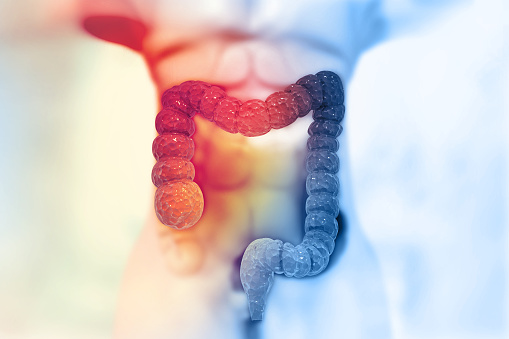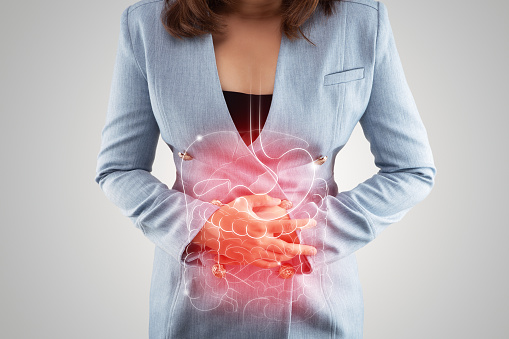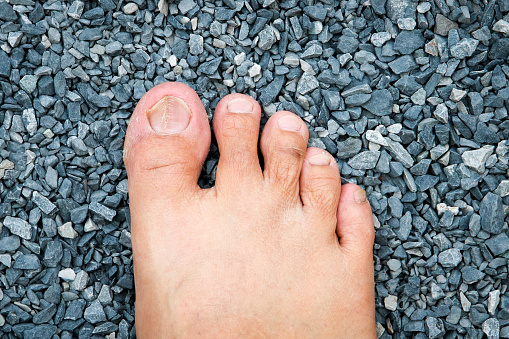What is Crohn’s Disorder ?

abdominal paan
Crohn’s disorder
Crohn’s disease is a sort of inflammatory bowel disorder (IBD) that could affect any phase of the gastrointestinal tract. Symptoms regularly consist of belly pain, diarrhea (which can be bloody if an infection is severe), fever, belly distension, and weight loss. Complications out of doors of the gastrointestinal tract can also consist of anemia, pores and skin rashes, arthritis, infection of the eye, and fatigue. The pores and skin rashes can be caused by conditions such as pyoderma gangrenosum or erythema nodosum. Bowel obstruction can also additionally arise as a problem of continual infection, and people with the disorder are at more threat of colon cancers and small bowel cancers.

While the reasons for Crohn’s disorder (CD) are unknown, it’s widely believed to result from an aggregate of environmental, immune, and bacterial elements in genetically prone individuals. It affects a continual inflammatory disorder, wherein the frame’s immune gadget defends the gastrointestinal tract, probably concentrated on microbial antigens. While Crohn’s is an immune-associated disorder, it no longer looks like an autoimmune disorder (in that the immune gadget isn’t being precipitated using the frame itself). The underlying immune trouble isn’t apparent but can be an immunodeficiency state.
About 1/2 of the general threat is associated with genetics, with greater than 70 genes being observed. Tobacco people who smoke are twice as likely to increase Crohn’s disorder as nonsmokers. It additionally regularly starts after gastroenteritis. Diagnosis is primarily based on findings, a biopsy and a look at the bowel wall, scientific imaging, and an outline of the disorder. Other situations that can be given further consist of irritable bowel syndrome and Behçet’s disease.
therapy for Crohn’s disorder
There isn’t any therapy for Crohn’s disease. Treatment alternatives are meant to assist with symptoms, hold remission, and save you from relapse. In the ones newly diagnosed, a corticosteroid can be used for a short period to unexpectedly enhance symptoms, along with some other medicinal drug, including both methotrexate or a thiopurine used to save you from recurrence.1Stopping smoking is suggested in humans with Crohn’s disorder.

One in five humans with the disorder is admitted to a medical institution every year, and half of those with the condition will require surgical treatment for the disease at some unspecified time over ten years. While surgical treatment has to be used as low as possible, it’s essential to deal with a few abscesses, bowel obstructions, and cancers. Checking for most bowel cancers is suggested every few years, beginning eight years after the disorder has started.
Crohn’s disease influences approximately 3.2 1,000 humans in Europe and North America, and around 1. fifty-four in 1,000 inside the UK. It is a much less unusual place in Asia and Africa. It has traditionally been a more excellent, not unique, place inside the evolved world. Rates have been increasing, mainly within the growing world, because of the 1970s. Inflammatory bowel disorder led to 47 hundred deaths in 2015, and people with Crohn’s disease have a barely decreased existence expectancy. It begins in teenagers and twenties, even though it may arise at any age. Males and girls are similarly affected.
Gastrointestinal
An aphthous ulcer at the mucous membrane of the mouth in Crohn’s disorder.
Many people with Crohn’s disorder have signs years before the diagnosis. The typical onset is within the young adults and twenties; however, it can arise at any age. Because of the ‘patchy’ nature of the gastrointestinal disorder and the intensity of tissue involvement, preliminary signs may be more diffused than ulcerative colitis. People with Crohn’s disorder revel in persistent ordinary intervals of flare-ups and remission.

The signs can alternate over the years as irritation increases and spreads. Symptoms also can be extraordinarily reliant on which organs are concerned. It is a common notion that the presentation of Crohn’s disorder is extraordinary for every affected person because of the excessive variability of signs, organ involvement, and preliminary expression.
Perianal pain will also be distinguished in Crohn’s disorder. Itchiness or ache across the anus can suggest irritation of the anus or perianal headaches together with anal fissures, fistulae, or abscesses across the anal area. Perianal pores and skin tags are uncommon in Crohn’s disorder and can seem without or with colorectal polyps. Fecal incontinence might also additionally accompany perianal Crohn’s disease.
Intestines
The Intestines, especially the Colon and Terminal Ilium, are the most usually affected body regions. Abdominal ache is a not unusual preliminary symptom of Crohn’s disorder, especially within the decreased right abdomen. Flatulence, bloating, and stomach distension are extra signs and can contribute to intestinal pain. Pain is frequently followed by diarrhea, which might also be further or not bloody. Inflammation in great intestinal tract regions can affect the feces’ exceptionality. Ileitis commonly affects large-quantity, watery feces, and at the same time, colitis might also bring about a smaller quantity of waste of a better frequency. Fecal consistency might also vary from strong to watery.

In extreme cases, a person might also have more than 20 bowel movements consistent with the day and want to rouse at night to defecate. Visible bleeding within the feces is much less unusual in Crohn’s disorder than in ulcerative colitis; however, it isn’t always uncommon. Bloody bowel actions are intermittent and can be brilliant red, darkish maroon, or black in shade. The shadeation of bloody stool relies upon the vicinity of the bleed. In extreme Crohn’s colitis, bleeding can be copious.
The stomach and esophagus belly are not often the only or essential web pages of CD. There are only some documented case reviews of adults with remoted gastric CD and no reviews inside the pediatric population. Isolated belly involvement could be an uncommon presentation, accounting for much less than 0.07% of all gastrointestinal CD. Rarely can the esophagus belly be affected by Crohn’s disorder. These can reason signs include issues with swallowing (dysphagia), higher stomach ache, and vomiting.
Oropharynx (Mouth) The mouth can be laid low with recurrent sores (aphthous ulcers). Recurrent aphthous ulcers are not unusual; however, it isn’t clear whether that is because of Crohn’s disorder or whether they may be a unique condition within the overall population. Other findings might include diffuse or nodular mouth swelling, a cobblestone look within the mouth, granulomatous ulcers, or pyostomatitis vegetans.

Medications typically prescribed to treat CD, including anti-inflammatory and sulfa-containing drugs, might also motivate lichenoid drug reactions within the mouth. Fungal contamination, which causes candidiasis, is likewise not uncommon because of the immunosuppression required within the disorder’s remedy. The incidence of anemia with pallor and angular cheilitis or glossitis is also not unusual because of dietary malabsorption.
People with Crohn’s disorder are also prone to Angular Stomatitis, an irritation of the corners of the mouth, and Pyostomatitis vegans.
Systemic
Like many persistent, inflammatory diseases, Crohn’s disease can cause numerous systemic signs and symptoms. Among kids, increased failure is not an unusual place. Many kids are first recognized with Crohn’s disease primarily based on a lack of ability to preserve increase. As it could occur at the time of the increased spurt in puberty, as much as 30% of kids with Crohn’s disorder might also have retardation of increase.

Fever will also be present, even though fevers more than 38.5 °C (101.3 °F) are unusual until there may be a hassle, including an abscess. Among older people, Crohn’s disease might also occur as weight loss, generally associated with reduced meal intake, considering that people with intestinal signs and symptoms from Crohn’s disease regularly experience higher once they no longer devour and may lose their appetite. People with a significant minor gut disorder may have malabsorption of carbohydrates or lipids, which may also exacerbate weight loss.
Visual
Inflammation of the indoor part of the eye, called uveitis, can motivate blurred imaginative and prescient eye pain, mainly while exposed to light (photophobia). Uveitis can cause a lack of imagination and is prescient if untreated.
Inflammation may involve the white part of the eye (sclera) or the overlying connective tissue (episclera), causing scleritis and episcleritis.
Other uncommon ophthalmological manifestations encompass conjunctivitis, glaucoma, and retinal vascular disorder.
Gall bladder and Liver
Crohn’s disease, which impacts the item, might also bring about an extended hazard of gallstones. This is because of a lower bile acid resorption within the ileum, excreted within the stool. As a result, the cholesterol/bile ratio will increase inside the gallbladder, resulting in an extended hazard for gallstones. Although the affiliation is more inside the context of ulcerative colitis, Crohn’s disorder will also be related to number one, sclerosing cholangitis, a kind of irritation of the bile ducts.

Liver involvement of Crohn’s disorder can encompass cirrhosis and steatosis. Nonalcoholic fatty liver disorder (NAFLD) and nonalcoholic steatohepatitis (NASH) are noticeably not unusual places and might slowly develop into an end-level liver disorder. NAFLD sensitizes the Liver to harm and will increase the hazard of growing acute or persistent liver failure following any other liver harm.
Crohn’s disease’s other uncommon hepatobiliary manifestations encompass cholangiocarcinoma, granulomatous hepatitis, cholelithiasis, autoimmune hepatitis, hepatic abscess, and peri cholangitis.
Neurological
Crohn’s ailment also can cause neurological headaches (reportedly in as much as 15%). The most unusual places of those are seizures, stroke, myopathy, peripheral neuropathy, headache, and despair.
Central and peripheral neurological issues are defined in sufferers with IBD and consist of peripheral neuropathies, myopathies, focal imperative frightened device defects, convulsions, confusional episodes, meningitis, syncope, optic neuritis, and sensorineural loss. Autoimmune mechanisms are proposed for involvement with IBD. Nutritional deficiencies related to neurological manifestations, including diet B12 deficiency, must be investigated. The spinal abscess has been said in each toddler and a grownup with preliminary lawsuits of intense returned ache because of extension of a psoas abscess from the epidural area to the subarachnoid area.
Psychiatric and mental

Crohn’s ailment is connected to many mental issues, despair and anxiety, denial of your ailment, the want for dependence or structured behaviors, feeling overwhelmed, and having a bad self-image.
Endocrinological or Hematological
Autoimmune hemolytic anemia, when the immune system assaults the crimson blood cells, is likewise not unusual in Crohn’s disease and might cause fatigue, a delicate appearance, and other signs not remarkable in anemia.
Secondary amyloidosis (AA) is any other uncommon, however severe, worry of inflammatory bowel ailment (IBD), commonly visible in Crohn’s disease. At least 1% of sufferers with Crohn’s disease expand amyloidosis. In the literature, the time-lapse between the onset of Crohn’s ailment and the analysis of amyloidosis has varied from one to 21 years.
Leukocytosis and thrombocytopenia are generally bcausedobyimmunosuppressant remedies or sulfasalazine. Plasma erythropoietin tiers frequently decrease in sufferers with IBD than expected, along with intense anemia.
Malnutrition Symptoms
People with Crohn’s ailment might also expand anemia because of diet B12, folate, iron deficiency, or anemia of persistent infection. The maximum, not unusual, is iron deficiency anemia from constant blood loss, decreased nutritional intake, and chronic irritation primary to extended hepcidin tiers, limiting iron absorption within the duodenum.

As Crohn’s ailment, maximum generally impacts the terminal ileum; when the diet B12/intrinsic element complicated is absorbed, B12 deficiency can be visible. This is mainly not unusual after a surgical operation to eliminate the ileum. Involvement of the duodenum and jejunum can impair the absorption of many different vitamins and folate. People with Crohn’s frequently have problems with small bowel bacterial overgrowth syndrome that could produce micronutrient deficiencies.
Complications
Intestinal Damage
Crohn’s ailment can result in mechanical headaches in the intestines, obstruction, fistulae, and abscesses. Obstruction generally happens from strictures or adhesions that slender the lumen, blocking off the passage of the intestinal contents. A fistula can expand among bowel loops, the bowel and bladder, the bowel and vagina, and the bowel and skin. Abscesses are walled-off infection concentrations that could arise within the stomach or the perianal area. Crohn’s is liable for 10% of vesicoenteric fistulae and is the maximum not unusual place for ileocecal fistulae.
Symptoms resulting from intestinal stenosis, or the tightening and narrowing of the bowel, are not unusual in Crohn’s ailment. Abdominal aches are frequently most intense in regions of the bowel with stenosis. Persistent vomiting and nausea might also imply stenosis from small bowel obstruction or ailment regarding the stomach, pylorus, or duodenum.
Research
Some proof supports the speculation that the bacterium Mycobacterium avium subspecies paratuberculosis (MAP) causes Crohn’s disease (see Johne’s disease additionally). As a result, researchers are searching for the eradication of MAP as a healing option. The Crohn’s MAP Vaccine is an experimental vaccine based on this speculation. Treating AP using precise antibiotics that MAP can be prone to have been tested, and the outcomes are doubtful but tentatively beneficial.
Crohn’s is not an unusual place in components of the arena wherein helminthic colonization is uncommon and uncommon in regions where maximum human beings bring worms. Infections with helminths can also regulate the autoimmune reaction that causes the disease. Trials of extracts from the malicious program Trichuris suis confirmed promising outcomes utilized in human beings with IBD. However, those trials (TRUST -I & TRUST -II) failed in Phase 2 medical trials and were discontinued after chronic failure in North America and Europe.
There isn’t any actual proof that thalidomide or lenalidomide is beneficial for keeping remission.
Read more: Crohn’s Disorder.r
















2 thoughts on "What is Crohn’s Disorder ?"